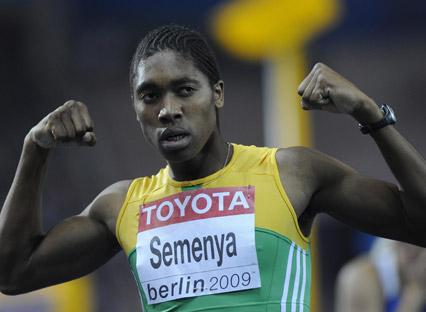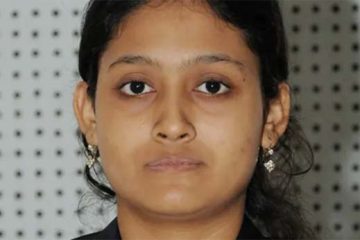 Teenager, who has lived her whole life as a woman, must undergo weeks of tests to establish if she has male chromosomes
Teenager, who has lived her whole life as a woman, must undergo weeks of tests to establish if she has male chromosomes
South African middle-distance runner Caster Semenya is at the centre of a controversy over her gender after winning gold in the women’s 800m at the athletics World Championships.
Such is the furore off the track that instead of celebrating her victory the 18-year-old, who won the race in a new personal best of 1:55.45, was forced to duck out of the limelight. The teenager only managed half-a-lap of honour before being whisked away from the stadium, avoiding the media and the winner’s press conference.
She will be back in the stadium today to collect her gold medal, and her appearance alone could overshadow many of the other events taking place.
Although Semenya has lived her whole life as a female her strength and appearance have raised fears that she may have been born with a rare abnormality, where she has grown up with the genitalia of a woman but has the chromosomes of a male.
For Semenya the race itself would have come as a welcome relief from the storm that has surrounded her at the championships, but her travails are likely to continue for some time. The International Association of Athletics Federations (IAAF) has revealed that she has already been subject to “gender verification” processes in her native South Africa and in Berlin, but the official investigation, involving an endocrinologist, a gynaecologist and a psychologist, could take weeks conclude.
Not only has the young athlete had to deal with official scrutiny and that of armchair observers around the world, other runners have been getting involved. After the race some of her rivals were quick to pass judgment. Russian Mariya Savinova, who was fifth, raised doubts over Semenya’s gender and Italian Elisa Piccione, who finished sixth, went as far as saying: “For me, she is not a woman”.
IAAF officials say that if the tests reveal Semenya is not a woman then she will lose her medal but general secretary Pierre Weiss said: “The athlete must be given the benefit of the doubt.”
Director of Communications, Nick Davies, described the situation as “very complex” and urged people to consider the impact the controversy could have on Semenya. “It’s a medical issue. It’s not an issue of cheating. We’re more concerned for the person not to make this something which is humiliating for her and something which is going to affect her in a negative way. This is why you will appreciate we have to be discreet. She is a human being who was born as a woman and who has grown up all her life as a woman but who is now in a position where this is being questioned.”
Semenya’s coach revealed that she had been mistaken for a man in South Africa in the past. “Caster just laughed and asked if they would like her to take off her pants to show them she was a woman,” he said.
The South African is not the first female athlete to face questions over her gender this year. German tennis player Sarah Gronert, who was born with male and female genitalia, was forced to undergo tests to prove she was a woman by the World Tennis Association in March, but was given the all clear.





